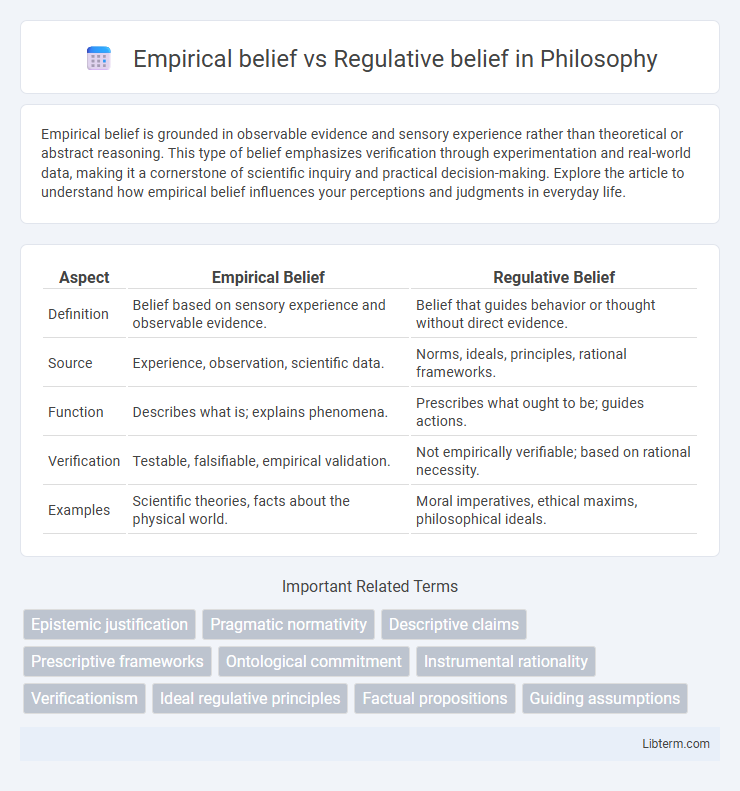Empirical belief is grounded in observable evidence and sensory experience rather than theoretical or abstract reasoning. This type of belief emphasizes verification through experimentation and real-world data, making it a cornerstone of scientific inquiry and practical decision-making. Explore the article to understand how empirical belief influences your perceptions and judgments in everyday life.
Table of Comparison
| Aspect | Empirical Belief | Regulative Belief |
|---|---|---|
| Definition | Belief based on sensory experience and observable evidence. | Belief that guides behavior or thought without direct evidence. |
| Source | Experience, observation, scientific data. | Norms, ideals, principles, rational frameworks. |
| Function | Describes what is; explains phenomena. | Prescribes what ought to be; guides actions. |
| Verification | Testable, falsifiable, empirical validation. | Not empirically verifiable; based on rational necessity. |
| Examples | Scientific theories, facts about the physical world. | Moral imperatives, ethical maxims, philosophical ideals. |
Defining Empirical Belief
Empirical belief is defined as knowledge derived from observation, experimentation, and sensory experience, grounding conclusions in tangible evidence. This form of belief contrasts with regulative belief, which involves guiding principles or ideals that shape behavior without necessarily being based on direct empirical data. Empirical beliefs are fundamental in scientific inquiry, ensuring assertions are testable and verifiable through measurable phenomena.
Understanding Regulative Belief
Regulative beliefs guide actions and decision-making by providing internal norms and goals, shaping behavior toward desired outcomes. Unlike empirical beliefs, which are based on factual evidence and observations, regulative beliefs influence how individuals interpret experiences and regulate their responses. Understanding regulative belief is crucial for developing effective motivation strategies and predicting behavioral patterns in various psychological and social contexts.
Core Differences Between Empirical and Regulative Beliefs
Empirical beliefs are grounded in observable evidence and sensory experience, serving as descriptive assertions about the world that can be tested and verified. Regulative beliefs function as guiding principles or norms that influence behavior and decision-making without requiring empirical verification. The core difference lies in empirical beliefs' reliance on factual data versus regulative beliefs' role in shaping actions based on value judgments or ideal standards.
Origins and Foundations of Beliefs
Empirical beliefs originate from direct observation and sensory experience, forming the foundation of knowledge through empirical evidence and scientific inquiry. Regulative beliefs, by contrast, are guiding principles or norms that shape behavior and thought without requiring empirical validation, often rooted in ethical, religious, or philosophical traditions. The origins of empirical beliefs lie in the natural world and experimentation, while regulative beliefs emerge from cultural, moral, and ideological frameworks that regulate conduct and meaning.
The Role of Evidence in Empirical Belief
Empirical beliefs are grounded in observable evidence and experimental data, relying on sensory experience and scientific methods to establish their validity. The role of evidence in empirical belief is crucial, as it serves as the foundation for verifying hypotheses and ensuring that conclusions correspond with reality. Unlike regulative beliefs, which guide behavior based on values or norms without requiring direct evidence, empirical beliefs demand continuous testing and validation through measurable proof.
Guiding Principles of Regulative Belief
Regulative beliefs serve as guiding principles that shape behavior and decision-making by providing normative frameworks rather than empirical evidence. These beliefs influence actions through value-driven rules and ideals, steering individuals toward desired outcomes based on moral or social norms. Unlike empirical beliefs grounded in factual observation, regulative beliefs prioritize aspirations and motivations to regulate conduct effectively.
Examples of Empirical Beliefs in Practice
Empirical beliefs are grounded in observable evidence and scientific methods, such as believing that water boils at 100degC under standard atmospheric pressure because it is consistently verified through experiments. Scientists' acceptance of gravity's effects, based on repeated experimental observations, exemplifies empirical belief in practice. These beliefs contrast with regulative beliefs, which guide behavior and values without necessarily relying on empirical evidence.
Real-World Applications of Regulative Beliefs
Regulative beliefs guide behavior and decision-making by shaping goals, motivations, and social norms, playing a crucial role in real-world applications such as education, organizational management, and mental health interventions. In educational settings, regulative beliefs influence students' self-regulation and achievement by dictating effort levels and persistence. Within organizations, these beliefs affect leadership styles and employee motivation, fostering a productive work environment through shared values and expected conduct.
Interplay Between Empirical and Regulative Belief
Empirical belief, grounded in observable evidence and experience, interacts dynamically with regulative belief, which shapes goals and guides behavior based on values or ideals rather than direct evidence. This interplay allows individuals to adapt their actions by integrating factual understanding with moral or aspirational frameworks, enhancing decision-making processes. Balancing empirical data with regulative principles ensures that beliefs remain both practical and meaningful within complex social and cognitive contexts.
Implications for Knowledge, Ethics, and Decision-Making
Empirical beliefs, grounded in observable evidence, shape knowledge by fostering verifiable understanding and influencing ethical frameworks through pragmatic consequences. Regulative beliefs, often guiding principles or ideals, impact decision-making by providing normative goals that direct behavior beyond empirical proof. Together, these belief types balance factual accuracy with value-driven guidance, crucial for coherent knowledge structures, ethical deliberation, and rational decisions.
Empirical belief Infographic

 libterm.com
libterm.com